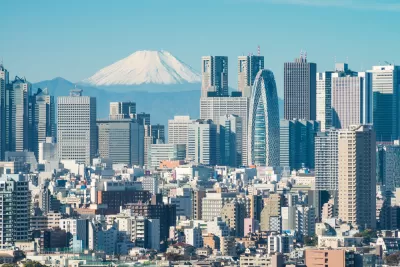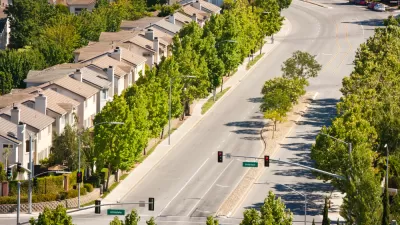Toronto, Tokyo, and Helsinki may have little in common, but they all top Metropolis Magazine's list of the world's most liveable cities, as named by an expert panel of designers and urbanists. Eight runnners-up were named in a variety of categories.

Toronto, for its job growth, greenbelt, and $20 billion in upcoming public investment; Tokyo for its safety, transit network, cost of living, and restaurants; and Helsinki, for its accessibility, population growth, bicycle infrastructure, and hospitality. The jury named eight runners-up for excellence in specific categories, like transport, landscape, and walkability. They include some usual suspects, like Copenhagen, Hong Kong, Melbourne, and Singapore, as well as some surprises, like Indianapolis, Medillin, Pittsburgh, and Rotterdam. Finally, some "up-and-coming" cities were named, including Christchurch, Doha, Tallinn, and Reno.
On Toronto: "Toronto is in the midst of a transformation that will make one of the most livable cities on earth even more attractive. Condo and office towers continue to pop up at a fast and furious rate as people—especially seniors and young professionals—flood into a downtown where they can enjoy Canada’s most urban environment. Growth in the inner core now outpaces suburbia for the first time since the 1970s—in 2014 alone, more than 20,000 residential units were completed.....The most obvious testament to the vitality of immigrant culture is Toronto’s burgeoning food scene. A city that barely knew what garlic was 50 years ago now relishes cuisines from the world over. Consider the case of Uncle Tetsu, the celebrated Japanese cheesecake maker who chose Toronto to open its first store outside Asia. The unassuming shop sells only the one item, but from the moment it appeared last April, the lineups have been blocks long."
On Tokyo: "It’s also this type of density and mixed programming that makes Tokyo one of the leading cities for 'aging in place.' With one of the oldest populations in the world, Tokyo, says aging-in-place expert Mark Hager, 'has committed considerable resources to rethinking how its communities are designed.' He cites centuries of multi-generational housing as one reason Tokyo has been quick to 'create communities where older people can continue living where they wish, have many generations and neighbors near, and still get the care or assistance they need.' Technology-driven efforts to service this demographic—ceiling cameras to monitor movement, beds that convert into wheelchairs, high-tech chair lifts—appear far ahead of similar developments in the United States."
On Helsinki: "The city is launching an on-demand bus service, called Kutsuplus, and planning to fold car- and bike-sharing into an ambitious smartphone-enabled public-transport system by 2025—the end goal being that car ownership will be unnecessary. This idea may seem extreme, but when one considers the city’s forward-thinking attitude and accessible technology—the ubiquitous free WiFi in the city is fast enough to allow video calling and HD streaming—it suddenly doesn’t seem so unattainable. 'As we question how designers are shaping, imagining, and forecasting futures,' says Harris, 'Helsinki, with all that’s going on, is in a very good position to answer that.'"
FULL STORY: The World's Most Livable Cities

Planetizen Federal Action Tracker
A weekly monitor of how Trump’s orders and actions are impacting planners and planning in America.

Congressman Proposes Bill to Rename DC Metro “Trump Train”
The Make Autorail Great Again Act would withhold federal funding to the system until the Washington Metropolitan Area Transit Authority (WMATA), rebrands as the Washington Metropolitan Authority for Greater Access (WMAGA).

DARTSpace Platform Streamlines Dallas TOD Application Process
The Dallas transit agency hopes a shorter permitting timeline will boost transit-oriented development around rail stations.

Renters Now Outnumber Homeowners in Over 200 US Suburbs
High housing costs in city centers and the new-found flexibility offered by remote work are pushing more renters to suburban areas.

The Tiny, Adorable $7,000 Car Turning Japan Onto EVs
The single seat Mibot charges from a regular plug as quickly as an iPad, and is about half the price of an average EV.

Supreme Court Ruling in Pipeline Case Guts Federal Environmental Law
The decision limits the scope of a federal law that mandates extensive environmental impact reviews of energy, infrastructure, and transportation projects.
Urban Design for Planners 1: Software Tools
This six-course series explores essential urban design concepts using open source software and equips planners with the tools they need to participate fully in the urban design process.
Planning for Universal Design
Learn the tools for implementing Universal Design in planning regulations.
Municipality of Princeton
Roanoke Valley-Alleghany Regional Commission
City of Mt Shasta
City of Camden Redevelopment Agency
City of Astoria
Transportation Research & Education Center (TREC) at Portland State University
US High Speed Rail Association
City of Camden Redevelopment Agency
Municipality of Princeton (NJ)




























